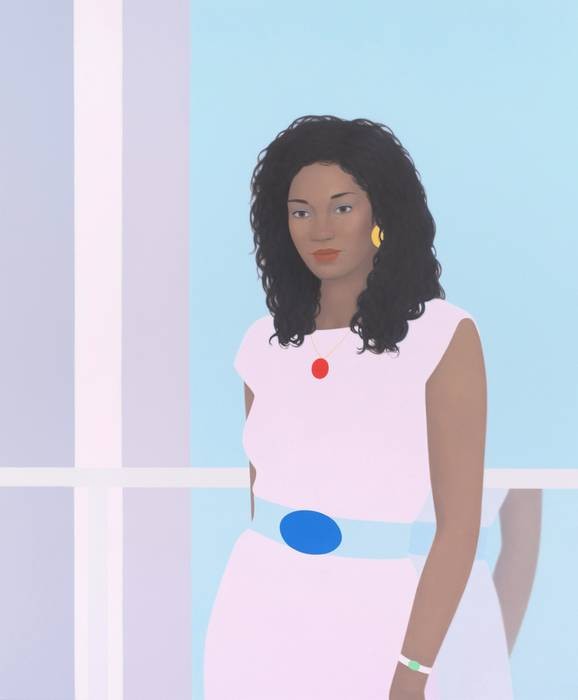Ridley Howard
30 Oct - 13 Dec 2014
RIDLEY HOWARD
City Waves
30 October – 13 December 2014
Koenig & Clinton is pleased to announce City Waves, its third solo exhibition of new works by Ridley Howard. The paintings included in the exhibition represent the culmination of a decade-long investigation into the subtle connections between painting and image, depiction and restraint, flatness of color and expansive depth.
The imagery presented in City Waves conjures fleeting memory and traces of the artist’s autobiography, simultaneously intimate and distant. Time and space meld into graphic composition; such familiar sights as a commuter ferry, a snow-covered park, or a couple in repose, amplify our perception of dimensionality, color, and duration. Howard’s keen observations of the familiar or the mundane yield an experience far more complex than it initially appears.
Inspired in part by the visual tension of mid-20th century Italian cinematography, City Waves balances optical design and two-dimensional arrangement with elusive narrative. Occasional graphic overtures—large spiraling swaths of pale green, off-kilter skyscrapers, monochromatic playground structures—imbue banal architectural spaces with intrigue, encouraging the viewer to identify the point where fact ends and fiction begins.
The works on view absorb diverse visual influences, including art historical traditions ranging from early Renaissance, both American and European Modernism, late Pop and contemporary portraiture. These and other cultural references rest beneath the work’s surface, creating a historically rich and highly personal vocabulary. Howard continues to sidestep traditional oppositions between abstract and referential painting strategies, and instead brings them into close proximity as a means of refining their mutual contribution to experiential impact.
The shapes and objects that gather on Howard’s canvases, rigorously considered and deftly executed, cement the works in the realm of painting. Playing with form by reducing a window to a rectangle, and softening lines, if not blurring them, are methods by which the artist’s everyday surroundings are distilled. In turn, our perception is lengthened, the mystery of the scene is elevated, and a quiet drama begins to unfurl.
Ridley Howard (b. 1973, Atlanta, GA) earned his M.F.A. at Tufts University and the School of the Museum of Fine Arts Boston in 1999 and his B.F.A. in Painting from the University of Georgia in 1996. He attended the Skowhegan School of Painting and Sculpture in 2000. His work has been exhibited at numerous institutions including: the Museum of Fine Arts Boston; the Savannah College of Art and Design, Atlanta and Savannah, GA; the National Academy Museum, New York; the High Museum of Art, Atlanta, GA; and the Knoxville Museum of Art, Knoxville, TN. He has been the recipient of a number of awards including the New York Foundation for the Arts Fellowship for Painting (2012), the Traveling Scholars Alumni Fellowship, SMFA (2011), the Joan Mitchell MFA Grant (1999), and the Pollock-Krasner Foundation Grant (2001). Howard lives and works in Brooklyn.
City Waves
30 October – 13 December 2014
Koenig & Clinton is pleased to announce City Waves, its third solo exhibition of new works by Ridley Howard. The paintings included in the exhibition represent the culmination of a decade-long investigation into the subtle connections between painting and image, depiction and restraint, flatness of color and expansive depth.
The imagery presented in City Waves conjures fleeting memory and traces of the artist’s autobiography, simultaneously intimate and distant. Time and space meld into graphic composition; such familiar sights as a commuter ferry, a snow-covered park, or a couple in repose, amplify our perception of dimensionality, color, and duration. Howard’s keen observations of the familiar or the mundane yield an experience far more complex than it initially appears.
Inspired in part by the visual tension of mid-20th century Italian cinematography, City Waves balances optical design and two-dimensional arrangement with elusive narrative. Occasional graphic overtures—large spiraling swaths of pale green, off-kilter skyscrapers, monochromatic playground structures—imbue banal architectural spaces with intrigue, encouraging the viewer to identify the point where fact ends and fiction begins.
The works on view absorb diverse visual influences, including art historical traditions ranging from early Renaissance, both American and European Modernism, late Pop and contemporary portraiture. These and other cultural references rest beneath the work’s surface, creating a historically rich and highly personal vocabulary. Howard continues to sidestep traditional oppositions between abstract and referential painting strategies, and instead brings them into close proximity as a means of refining their mutual contribution to experiential impact.
The shapes and objects that gather on Howard’s canvases, rigorously considered and deftly executed, cement the works in the realm of painting. Playing with form by reducing a window to a rectangle, and softening lines, if not blurring them, are methods by which the artist’s everyday surroundings are distilled. In turn, our perception is lengthened, the mystery of the scene is elevated, and a quiet drama begins to unfurl.
Ridley Howard (b. 1973, Atlanta, GA) earned his M.F.A. at Tufts University and the School of the Museum of Fine Arts Boston in 1999 and his B.F.A. in Painting from the University of Georgia in 1996. He attended the Skowhegan School of Painting and Sculpture in 2000. His work has been exhibited at numerous institutions including: the Museum of Fine Arts Boston; the Savannah College of Art and Design, Atlanta and Savannah, GA; the National Academy Museum, New York; the High Museum of Art, Atlanta, GA; and the Knoxville Museum of Art, Knoxville, TN. He has been the recipient of a number of awards including the New York Foundation for the Arts Fellowship for Painting (2012), the Traveling Scholars Alumni Fellowship, SMFA (2011), the Joan Mitchell MFA Grant (1999), and the Pollock-Krasner Foundation Grant (2001). Howard lives and works in Brooklyn.

